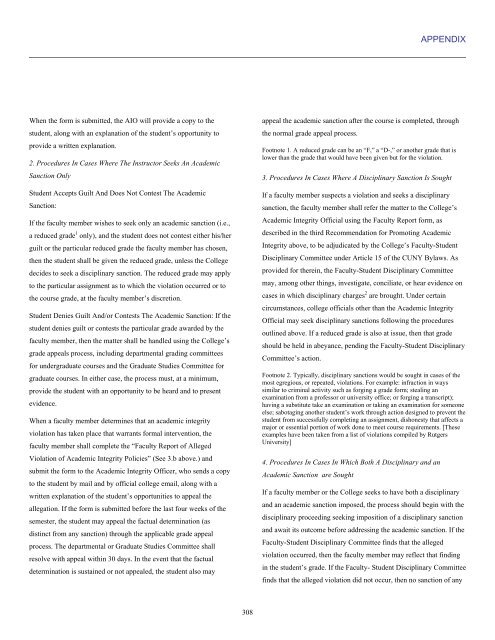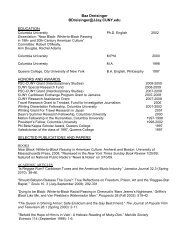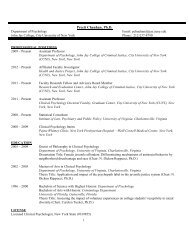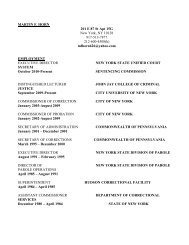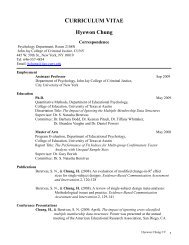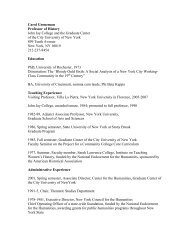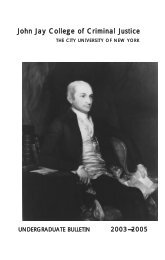Bulletin - John Jay College Of Criminal Justice - CUNY
Bulletin - John Jay College Of Criminal Justice - CUNY
Bulletin - John Jay College Of Criminal Justice - CUNY
You also want an ePaper? Increase the reach of your titles
YUMPU automatically turns print PDFs into web optimized ePapers that Google loves.
APPENDIX<br />
When the form is submitted, the AIO will provide a copy to the<br />
student, along with an explanation of the student’s opportunity to<br />
provide a written explanation.<br />
2. Procedures In Cases Where The Instructor Seeks An Academic<br />
Sanction Only<br />
Student Accepts Guilt And Does Not Contest The Academic<br />
Sanction:<br />
If the faculty member wishes to seek only an academic sanction (i.e.,<br />
a reduced grade 1 only), and the student does not contest either his/her<br />
guilt or the particular reduced grade the faculty member has chosen,<br />
then the student shall be given the reduced grade, unless the <strong>College</strong><br />
decides to seek a disciplinary sanction. The reduced grade may apply<br />
to the particular assignment as to which the violation occurred or to<br />
the course grade, at the faculty member’s discretion.<br />
Student Denies Guilt And/or Contests The Academic Sanction: If the<br />
student denies guilt or contests the particular grade awarded by the<br />
faculty member, then the matter shall be handled using the <strong>College</strong>’s<br />
grade appeals process, including departmental grading committees<br />
for undergraduate courses and the Graduate Studies Committee for<br />
graduate courses. In either case, the process must, at a minimum,<br />
provide the student with an opportunity to be heard and to present<br />
evidence.<br />
When a faculty member determines that an academic integrity<br />
violation has taken place that warrants formal intervention, the<br />
faculty member shall complete the “Faculty Report of Alleged<br />
Violation of Academic Integrity Policies” (See 3.b above.) and<br />
submit the form to the Academic Integrity <strong>Of</strong>ficer, who sends a copy<br />
to the student by mail and by official college email, along with a<br />
written explanation of the student’s opportunities to appeal the<br />
allegation. If the form is submitted before the last four weeks of the<br />
semester, the student may appeal the factual determination (as<br />
distinct from any sanction) through the applicable grade appeal<br />
process. The departmental or Graduate Studies Committee shall<br />
resolve with appeal within 30 days. In the event that the factual<br />
determination is sustained or not appealed, the student also may<br />
appeal the academic sanction after the course is completed, through<br />
the normal grade appeal process.<br />
Footnote 1. A reduced grade can be an “F,” a “D-,” or another grade that is<br />
lower than the grade that would have been given but for the violation.<br />
3. Procedures In Cases Where A Disciplinary Sanction Is Sought<br />
If a faculty member suspects a violation and seeks a disciplinary<br />
sanction, the faculty member shall refer the matter to the <strong>College</strong>’s<br />
Academic Integrity <strong>Of</strong>ficial using the Faculty Report form, as<br />
described in the third Recommendation for Promoting Academic<br />
Integrity above, to be adjudicated by the <strong>College</strong>’s Faculty-Student<br />
Disciplinary Committee under Article 15 of the <strong>CUNY</strong> Bylaws. As<br />
provided for therein, the Faculty-Student Disciplinary Committee<br />
may, among other things, investigate, conciliate, or hear evidence on<br />
cases in which disciplinary charges 2 are brought. Under certain<br />
circumstances, college officials other than the Academic Integrity<br />
<strong>Of</strong>ficial may seek disciplinary sanctions following the procedures<br />
outlined above. If a reduced grade is also at issue, then that grade<br />
should be held in abeyance, pending the Faculty-Student Disciplinary<br />
Committee’s action.<br />
Footnote 2. Typically, disciplinary sanctions would be sought in cases of the<br />
most egregious, or repeated, violations. For example: infraction in ways<br />
similar to criminal activity such as forging a grade form; stealing an<br />
examination from a professor or university office; or forging a transcript);<br />
having a substitute take an examination or taking an examination for someone<br />
else; sabotaging another student’s work through action designed to prevent the<br />
student from successfully completing an assignment, dishonesty that affects a<br />
major or essential portion of work done to meet course requirements. [These<br />
examples have been taken from a list of violations compiled by Rutgers<br />
University]<br />
4. Procedures In Cases In Which Both A Disciplinary and an<br />
Academic Sanction are Sought<br />
If a faculty member or the <strong>College</strong> seeks to have both a disciplinary<br />
and an academic sanction imposed, the process should begin with the<br />
disciplinary proceeding seeking imposition of a disciplinary sanction<br />
and await its outcome before addressing the academic sanction. If the<br />
Faculty-Student Disciplinary Committee finds that the alleged<br />
violation occurred, then the faculty member may reflect that finding<br />
in the student’s grade. If the Faculty- Student Disciplinary Committee<br />
finds that the alleged violation did not occur, then no sanction of any<br />
308


